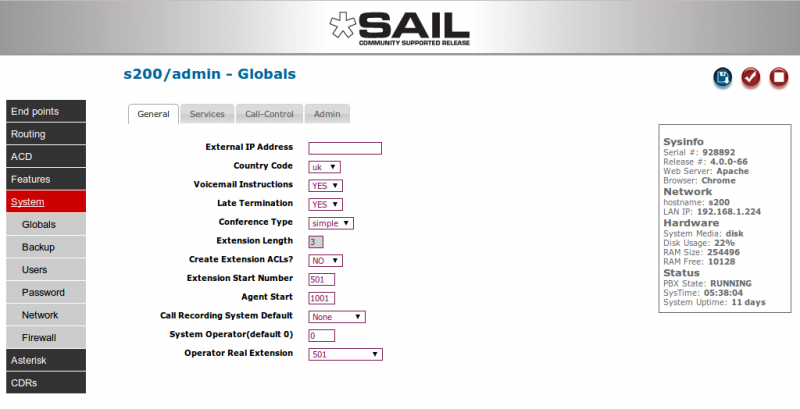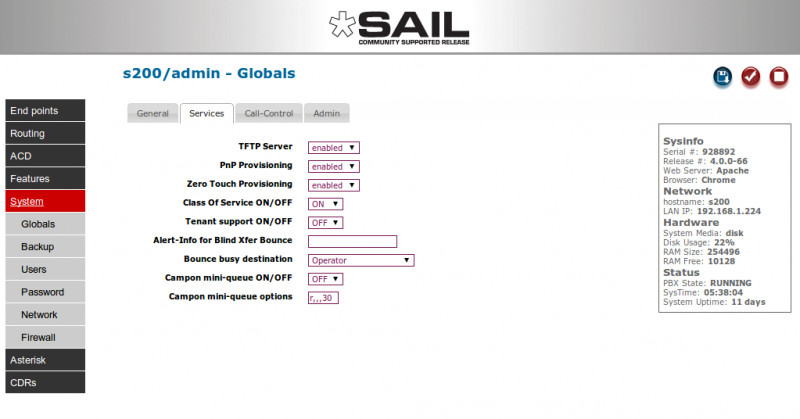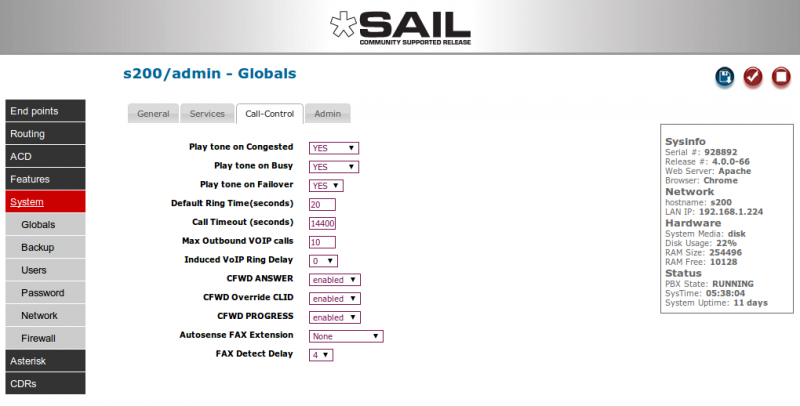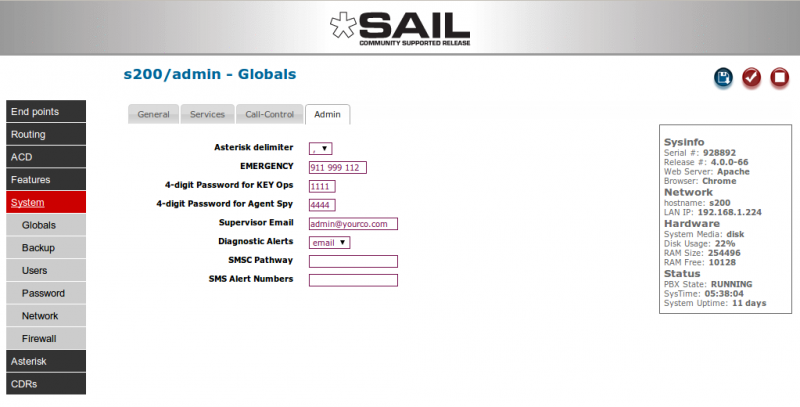SARK V4.0.0 Globals
Globals
The SARK globals panel is where we set system-wide variables which control aspects of the overall behaviour of the PBX. For convenience, the values are loosely grouped under 4 tabs, or sections, called; "General", "Services", "Call-Control" and "Admin". Aside from a few exceptions, most values can be left to default. You can get help for any particular variable by hovering your mouse over its heading.
- External IP Address - this is your Internet IP address. Asterisk puts this value into the SIP packets it sends. You will usually need to specify this if you wish to conduct SIP operations across the Internet.
- Country Code - Set the drop down to match your country
- Voicemail Instructions - when set to yes, the auto-attendant will give a more verbose introduction when it goes to voicemail.
- Delete voicemail after (days) - specify the number of days to keep voicemail before deleting it
- Conference type - specify simple or hosted conferencing
- Extension length - can be 3 or 4 but cannot be set/changed unless there are no extensions so you would normally do this only at system installation.
- Create extension ACL's? - if set to yes, the generator will automatically insert an ACL each time you create a new extension.
- Extension start number - lowest extension on this PBX
- Agent start - lowest agent number on this PBX
- Call recording system default - sets an overall default for call recording.
- System operator - sets a short key for the system operator (default is 0).
- Operator real extension - the actual operator extension or group.
provisioning services
- TFTP server - enable/disable the on-board tftp provisioning server
- PnP Provisioning - enable/disable SIP multicast (PnP) provisioning
- Zero Touch Provisioning - enable/disable ZTP
system services
- Class of Service - enable/disable CoS
- Tenant Support - enable/disable tenant support
vintage services
- Alert Info for blind transfer bounce - set an info string for a distinctive ring on a bounce
- Bounce busy destination - specify an alternate destination for a bounce to a busy phone
- Camp-on mini-queue - enable/disable camping on an extension
- Camp-on mini-queue options - asterisk queue options for the mini-queues
- Late Termination - YES/NO. Determines when Asterisk will answer (terminate) the call. This should almost always be set to YES.
- Play Tone on Congested - YES/NO. If set to "YES" a re-order tone will be generated, if set to "NO" the auto-attendant will announce that the call could not be completed.
- Play Tone on Busy - YES/NO. If set to "YES" a busy tone will be generated, if set to "NO" the auto-attendant will play a busy message.
- Play Tone on Failover - YES/NO. If set to "YES" a beep will be played when a trunk fails over to a back-up trunk, if set to "NO" nothing will be played.
- Default Ring Time - in seconds. System-wide default for extensions. Usually set to about 15 or 20 seconds. It can be overridden at each extension using **26**
- Call Timeout - in seconds. System-wide absolute timeout. Default is 14400 seconds (4 hours).
- Max outbound VoIP calls - System-wide limit on the number of outbound VoIP calls that will ever be started. Individual tenants can also have call limits imposed within this overall limit.
- Induced VoIP Ring Delay - in seconds. Generates a ring-back tone for the number of seconds specified before routing the call. This is sometimes useful when running an IVR on a VoIP trunk.
- CFWD Answer - enabled/disabled. When enabled, calls which are being forwarded through the PBX to a remote end-point (for example a call forwarded to a mobile) will be terminated by the PBX before forwarding. This can sometimes be necessary for RTP NAT Traversal.
- CFWD Override CLID - enabled/disabled. When enabled, calls which are being forwarded through the PBX to a remote end-point will be tagged with the CLID specified by the forwarding extension.
- CFWD Progress - enabled/disabled. When enabled, calls which are being forwarded through the PBX to a remote end-point will have progress tones generated by the PBX. This can sometimes be necessary for RTP NAT Traversal.
- Autosense FAX extension - Extension to send detected faxes to. This is for analogue lines only.
- FAX detect delay - length of time (in seconds) to delay while asterisk attempts to sense FAX tones. Analogue lines only.



